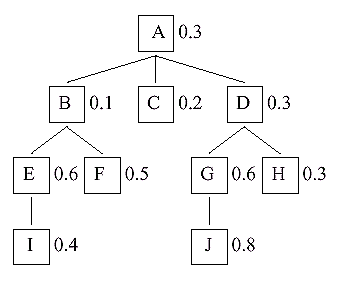|
(a)Intelligent systems generally conform
to one of the following architectures:Von Neumann, list-processing,or
connectionist.
(i)Briefly describe the Von Neumann architecture.[2 marks ]
A Von Neumann machine is a serial processor
(1)having addressable memory capable of storing program and data (1),and
has operators for comparing symbol structure and branching (1).(Maximum
2 mmarks)
(ii)Briefly describe the list-processing architecture.[2 marks ]
In the list-processing architecture ,memory
is organised into associative structures, lists and property lists
(1).Operators allow lists to be created, destroyed or manipulated
(1).The elements in the lists are symbols and capable of indexing
other symbols and lists (1).(Maximum 2 mmarks)
(b)Briefly describe the processes of
sensation and perception.[3 marks ]
In sensation, our sensory receptors absorb
raw physical energy (1).Through the process of transduction, this
energy is converted into neural signals that are sent to the brain
(1).In perception, these signals are then elected, organised and interpreted
to give them meaning (1).
(c)(i)State the four basic principles of learning arising from Pavlov
's work on classical conditioning.[4 marks ]
oThe acquisition of conditioned response
is influenced by the order and timing of the conditioned stimuli and
unconditioned stimuli .(1)
oRepeated presentation of the conditioned stimulus without the unconditioned
stimulus causes the conditioned response to lose its power.(1)
oAfter an organism is conditioned to a condition stimulus, similar
stimuli will often evoke the conditioned response through generalisation.(1)
oDiscrimination is process of learning to distinguish between stimuli.(1)
(ii)Illustrate one of these principles by way of an example.[1 mark
]
For example, if a dog has been trained to
bark every time a bell rings, and not to bark when a horn sounds,
if the dog subsequently only hears the bell, it will stop barking
after a while. Give one mmark for any reasonable example of any of
the principles.
(d)Distinguish between the processes of discrimination and identification.[4
mmarks ]
Discrimination is the ability to tell more
than one object apart.(1)Features of theobject are extracted from
the object and compared to look for differences.(1). Discrimination
determines the degree of similarity between object (1).(Maximum 2
marks)
Identification is the ability to name a single
object (1)and relate it to a unique symbol. (1)(Invariant)features
are extracted to allow u to determine if the object belong to a category
(1).(Maximum 2 marks)
(e)In the following state space graph, the character in the node identifies
the node, and the number beside each node shows the value returned
by an evaluation function (i.e. how desirable it is to reach that
node).A heuristic search strategy will choose to expand the node with
the highest evaluation function, create all of its children, and then
apply the evaluation function to all of these children. The goal node
is J.

(i)State the order in which the nodes
will be created.[1 mark ]
Order of node creation: ABCDGHJ (1)
(ii)Name one disadvantage of heuristic searches.[1 mark ]
A heuristic search may not be able to find
a solution at all (1);heuristic only use limited local information,
and cannot predict what will happen further on in the search (1);a
heuristic search may result in a sub-optimal solution (1).(Maximum
1 mark)
(f)Artificial neurons can be combined
to produce an artificial neural network. One such type of network
consists of an input layer, a hidden layer and an output layer, which
some textbooks refer to as a 3-layer network.However, some authors
insist on calling such a network a 2-layer network. Explain the reason
for the discrepancy. Suggest a better naming technique that removes
the ambiguity.[3 marks ]
The former counts each layer of the network,
regardless of the functions performed.(1) The latter holds the view
that since the input layer 's function is solely to distribute input
values to the next layer, it does not count as a layer, as no computation
is performed; thus, only the two layers that perform computation are
counted.(1) A better naming convention is to clearly specify the number
of nodes in each layer, for example a network with 3 nodes in the
input layer,3 nodes in the hidden layer and 2 nodes in the output
layer would be called a 3-3-2 network.(1)for any reasonable suggestion.
(g)An organisation is thinking of converting
all of its various printed documents into digital format using character
recognition.
(i)If the characters are to be recognised using template matching,
how many templates would be required to match all the uppercase characters
of the English language?[2 marks ]
Such a system would require 26 templates
for each combination of font face, font size and orientation.(1)for
26 templates,(1)for understanding the concept of combining different
attributes of the font.
(ii)Commenting on the efficiency of such a system, explain whether
you think that it would be feasible.[2 marks ]
It is highly inefficient, as a very large
number of templates would be required (1). Such a system would therefore
be infeasible (1).
(h)What are phonemes and morphemes?[2
marks ]
Phonemes are units of meaningful sounds (1)while
morpheme are units of words that have meanings (1).
(i)Alan Turing 's intelligence test concludes that a computer can
be described as intelligent if it can fool a human being into thinking
that it is human.
(i)Briefly describe two shortcomings of this method for identifying
intelligence in a computer.[2 marks ]
In order to fool the human participant, the
computer program would need to respond with the speed of a human,
which, in most instances, is lower than what the computer can perform
(1).Secondly, as human being make mistakes, the program must make
mistakes too, in order to be convincing (1).
(ii)State and justify your own perspective on the possibility of an
intelligent machine ever being created.[1 mark ]
(1)for an appropriately justified statement
on the possibility of intelligent machine .
|
